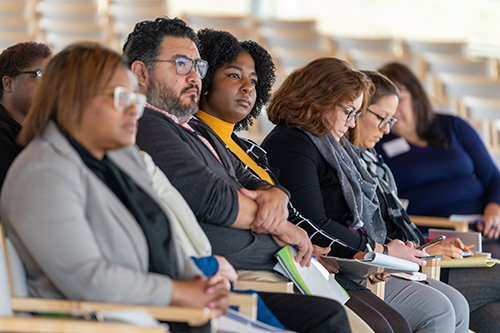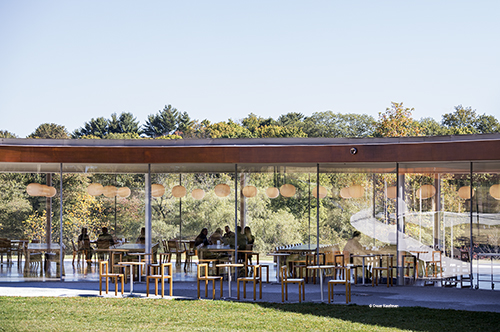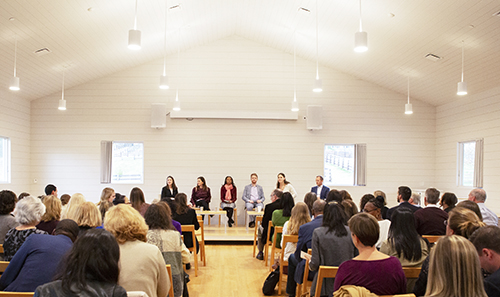Topics
We don’t have an innovation shortage; we have an impact shortage.
by Karen Kariuki, Community Initiative & Strategic Partnerships Director at Grace Farms Foundation
From businesses to not-for-profit organizations to government initiatives to educational institutions — the concept of innovation is ubiquitous. So much in fact, that the word itself has almost only positive associations; it is seemingly a concept that requires little explanation and doesn’t expect argument.
But what if innovation alone is not sufficient? What if, in fact, we should consider factors beyond innovation as we seek to advance social good? What if innovation — in order to be sustainable — requires additional nuance and balance and a greater focus on impact, partnership, and progress?
For Grace Farms Foundation, this consideration is intentionally built into our approach. We seek to leverage our platform as both convener and collaborator. We seek to drive both thought and action and serve as a place of both listening and doing – in order to advance good in the world.

The Community Initiative at Grace Farms is creating opportunities for diverse audiences to boldly come together, foster unity, and advance good in the world. ©Elias Rosario
To explore these connections in greater depth, Grace Farms Foundation has launched its “Impact and Innovation Series,” a succession of engagements that will explore models that aim to both pursue bold strategies while aiming to achieve profound effect. We will begin by examining models that effectively drive change, at the intersection of impact and innovation, led by international experts to identify best practices, challenges, and opportunities. The series launched in November with a focus on A Changing World of Philanthropy, will subsequently explore topics such as Using Data as a Lever for Social Change, Inclusion & Equity, and Othering & Belonging.
By bringing together people and organizations from differing perspectives, we can break down barriers, and as a result, generate new outcomes. We will seek to achieve the vision of fostering communities that are civil, communities that flourish, and communities that are inclusive of all.

Our open architecture and hospitality encourages exploration and collaboration among our five initiatives and diverse audiences.
Through our focus on advancing good in the world, it is clear that focusing on both impact and innovation is critical to achieving new outcomes. Across stakeholders, when we swing between the extremes — where we single handedly focus on innovation — or single handedly focus on impact, there are unintended consequences. By focusing purely on innovation alone, we can often seek the new, the shiny, the bold, the different without a lens toward what actually works. On the other hand, when we seek to singularly focus on quarterly earnings, and data as a stand-alone, we can miss what nimble and forward-looking changes might help us to more rapidly or more sustainably advance our work.
Time and time again, leaders have driven efforts with “innovative solutions” and “cutting-edge models” never shying away from hard – if not impossible – areas to change. These efforts required extensive commitment and ongoing resources. But in many cases, despite the investment of capital and time, they have ended these efforts — sometimes abruptly — after acknowledging they were failing to generate intended results.
Why does this happen?
The first reason is that when we refer to an effort as “innovative” — the necessary due diligence for success is often passed over. “This is new!” “This is different!” “This is BOLD!” we exclaim, hoping that a new idea will be the silver bullet.
When our focus is on innovation — it is often on the Innovator — rather than on the cause — the person or community in need. Innovation from the outside often delivers change onto the community — delivering a framework developed in Location A and implemented in Location B — rather than with the community. This is amplified because innovative efforts are transient — they are trendy — they change with time in an effort to be current — but the end result is that no effort is truly sustained.
But effective change is not what happens through initiatives with catchy names, designed far away from the people it seeks to serve. Change is what happens one person at a time, one connection at a time, and one community at a time.
But progress? Progress is interactive. Progress listens. Progress is invested. Progress isn’t usually shiny and sparkly. Progress rarely makes headlines. Because progress recognizes that incremental gains are still gains — a steppingstone toward long-term impact.
Innovation breeds one-time headlines. Progress breeds stories of transformation over time.
Consider, for a moment, the Robert Wood Johnson Foundation, who nearly 40 years ago, launched small, regional pilots to address a community-wide need for emergency medical response. Ultimately, this pilot solution — an incremental response to achieve regional impact — spawned the national 911 system that is now not only a nationwide service — but laid the groundwork as an international model of innovation that has been leveraged globally.
Or Warby Parker, a company that built the vision of driving innovation into the very fabric of its DNA as a company. In fact, their number 12 hire into the company was a Director of Social Innovation. But to achieve innovation, they leveraged a model that achieved impact for both communities in need and consumers, who were directly engaged in advancing good. Warby Parker’s Buy a Pair, Give a Pair program ensures that for every pair of Warby Parker glasses purchased, a pair of glasses is distributed to someone in need. This model of incremental progress has now inspired hundreds of other companies that have leveraged similar models as part of their structure.
The Community Initiative at Grace Farms Foundation, one of five strategic initiatives, is leveraging this frame as the guide for our strategic work. As we examine how to approach, how to move, and how to make progress — on those issues that have the potential to either erode or amplify our communities — it is critical for us to root our work in both the needs of the community and the best practices on a global scale, to bring a tailored approach to the local level.
Through the Justice Initiative at Grace Farms Foundation, which focuses on local, national, and global training, advocacy, and policy to disrupt contemporary slavery and gender-based violence, we have built a platform to advance public-private partnerships by serving as a convening place to train law enforcement on new ways to gather evidence and share information that can improve investigations of human trafficking, labor trafficking, wildlife trade, and gender-based violence.
Grace Farms Foundation offers its expertise and provides free trainings, filling a gap in a lack of government spending so law enforcement can prevent, protect, and prosecute these crimes.
At Grace Farms Foundation, it is our hope to explore the needs of our communities, listen carefully to how best to address these obstacles, and foster collaboration and new outcomes with our community partners. We seek to narrow the divide and create pathways to connect progress and innovation. We seek to thoughtfully develop strategies in partnership, build audacious but thoughtful timelines, and then build solutions together.

Through private convenings and public programing, our Community Initiative extends its platform with innovators in the social impact and philanthropic fields. © Vanessa Van Ryzin
Through our hopeful space, Grace Farms is able to leverage its platform as a vehicle for purpose-driven social impact and change. We are able to encourage collaboration, connect audiences and organizations, and build partnerships across sectors that result in sustainable impact.
Our Space Grants Program brings this vision into reality, whereby the Foundation offers the gift of free space to our not-for-profit and community partners for meetings, programs, and events. Unlike traditional monetary grants, space grants provide those at the front lines of service with an opportunity to reconnect, reflect, advocate, align, and grow. In many cases, organizations that start out by hosting a small board retreat at Grace Farms then accelerate action because of the space and proximity to critical issues, and become a more robust partner.
In 2018, one of our not-for-profit partners, Supportive Housing Works, received its first space grant given the alignment of their critical work in our community. Over the course of two years of meetings at Grace Farms — both internal meetings of their own, and engagement with the Community Initiative — they recognized that while their mission is to end homelessness in Fairfield County — that the more systemic solution would come from bringing together stakeholders across sectors. In October 2019, Supportive Housing Works held a convening of 200 inter-disciplinary partners to break down barriers, foster connections, and bring about new outcomes through the hopeful and collaborative platform of Grace Farms.
At its most imaginative, our restorative and hopeful space expands possibilities for all who enter — generating new ideas, drawing together diverse communities and opening lines of communication across barriers. The ideas generated and relationships built within and outside of the porous architecture of Grace Farms are then carried out into the world and translated into endless ripples of change.
As we seek to develop innovative possibilities in collaboration with those we seek to serve, we will invest in progress in enduring ways. We look forward to partnering with you in that effort.
Karen Kariuki is the Community Initiative & Strategic Partnerships Director at Grace Farms Foundation. She has spent her career creating social impact, driving change, and delivering results at the intersection of public-private partnerships. She most recently launched Factor, a company committed to advancing purpose, and led the philanthropic efforts at the GE Foundation in the area of education. Karen has her MBA from the Tuck School of Business at Dartmouth and her BA from Stanford University.
Sign up for our newsletter to learn more about Grace Farms’ programs and our initiatives: nature, arts, justice, community, and faith.

